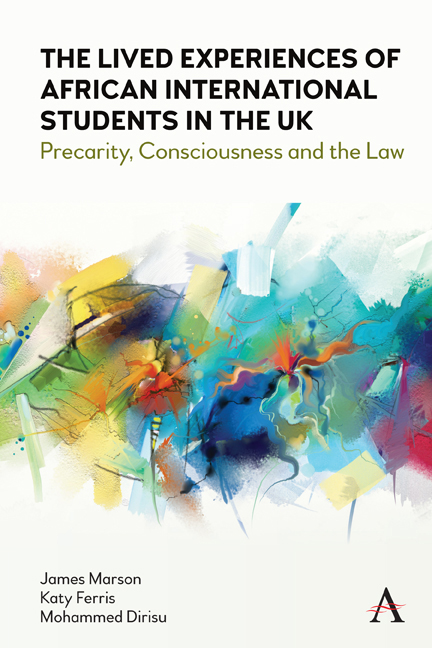 The Lived Experiences of African International Students in the UK
The Lived Experiences of African International Students in the UK Book contents
- Frontmatter
- Contents
- Preface
- Acknowledgements
- Legislation
- Case Law
- 1 Introduction
- 2 Methodology
- 3 Student Migration and Global Inequality
- 4 Migration as a Socio-Legal Phenomenon
- 5 The ‘Student-Migrant-Worker’ Meets ‘Precarity’
- 6 The ‘Utterly Transactional Worker’
- 7 Semi-Legal Working?
- 8 Conclusions
- Bibliography
- Index
4 - Migration as a Socio-Legal Phenomenon
Published online by Cambridge University Press: 13 September 2022
- Frontmatter
- Contents
- Preface
- Acknowledgements
- Legislation
- Case Law
- 1 Introduction
- 2 Methodology
- 3 Student Migration and Global Inequality
- 4 Migration as a Socio-Legal Phenomenon
- 5 The ‘Student-Migrant-Worker’ Meets ‘Precarity’
- 6 The ‘Utterly Transactional Worker’
- 7 Semi-Legal Working?
- 8 Conclusions
- Bibliography
- Index
Summary
Introduction
The reception within the territory of a state to migrants, and indeed to migration generally, is influenced by the zeitgeist of the time and this political stance is matched by regulation and law-making. The subject of migration is just one of the several instances where there is a real-time interpolation of the social and legal orders, and it helps that the socio-legal scholarship is seemingly not intent on drawing (to distraction) theoretical distinctions between these two disciplines (Albiston 2005; Cotterrell 2002; Nelken 2009). This understanding apparently defies the positivists’ view of the law as neatly extractible from the social structures and interpretive schemas that mediate everyday lives (Banakar 2015).
This chapter begins with an examination of the intricacies of socio-legal studies and migration as an empirical undertaking. This includes a review of the socio-legal schemas deployed to account for the relationship migrants have with the law in the host state, including legal assimilation and adaptation, while noting their inherent flaws. This segues into a discussion of the empirical framework of legal consciousness (Ewick and Silbey 1998) which we use as the principal schema for this aspect of our study. However, our approach has been adapted to incorporate notions of legal pluralism and second-order consciousness so to make it more relevant for the nature of this study. In the second part of the chapter we review the concept of legal mobilisation and migrants’ claims-making behaviour. This includes a discussion of the ‘naming, blaming, and claiming’ dispute transformation pyramid as introduced by Felstiner et al. (1980). In the final substantive aspect of the chapter, the migrants’ relationship with state bureaucratic structures is considered. Here, we deconstruct and critique the subject of migrant legal status as an empirical object. Further, we review the concept of semi-legality in respect of student-migrants, which is being deployed as an indeterminate (perhaps halfway point) between legality and illegality of migrant labour. We close the chapter with a discussion that ties the three frameworks – legal consciousness, legal mobilisation and semilegality – and consider how these cumulatively inform socio-legal scholarship and migration.
- Type
- Chapter
- Information
- The Lived Experiences of African International Students in the UKPrecarity, Consciousness and the Law, pp. 55 - 94Publisher: Anthem PressPrint publication year: 2022


